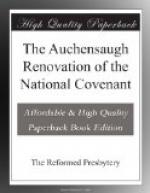Upon Thursday, July 24th, after singing a part of the 105th Psalm, from the 6th to the 12th verse, and prayer—Mr. John M’Millan preached upon Isaiah, xliv. 5—“One shall say I am the Lord’s: and another shall call himself by the name of Jacob: and another shall subscribe with his hand unto the Lord, and sirname himself by the name of Israel.” Whereupon, after the unfolding of the context, and explication of the words, showing that they clearly contain an intimation of a covenant relation betwixt God and a people, and their avouching of the same upon their part; the words seeming to have a reference to the state of the New Testament Church, and conversion of the Gentiles, who, being allured by the great gospel blessings and mercies bestowed by God upon the Jews, to join themselves to the church, should avouch their interest in the Messiah and covenant of grace, by taking the Lord for their God, and owning themselves to be his people. So that the words may be taken up as an answer to such a presupposed question as this, Whose are you? and what is your name? To which question, one shall answer, I am the Lord’s; another, I am one of old Jacob’s family and offspring; another, if you desiderate my name, look the covenant subscriptions and you will find it there; another shall say, whatever my name was before, my sirname now is an Israelite. So sweetly should a shower of gospel grace engage the hearts of the New Testament converts to avow their covenant relation to the Lord, and glory in their union with his church and covenanted people. Having taking up the sense of the words to this effect, he deduced from them these two observations:
1. That the Lord is graciously pleased sometimes to privilege his people with very remarkable tokens of his gracious presence. This doctrine is clear from the context, verses 3d and 4th—“For I will pour water upon him that is thirsty, and floods upon the dry ground; I will pour my Spirit upon thy seed, and my blessing upon thine offspring. And they shall spring up as among the grass, as willows by the watercourses.”




